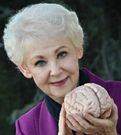Part 5 - Immune Boosters 1-8
©Arlene R. Taylor, PhD www.ArleneTaylor.org

The Doctor Within is your own personal and unique brain-body healing system.
Estimates are that 85 percent of illnesses are within your immune system’s reach for healing.
Fortunately, “boosters” have been identified. Here are the first eight components of fourteen addressed in this series.
1. Mindset. Your mindset matters. It affects everything. ―Peter Diamandis
A positive, active, and creative mindset provides the foundation and direction for an immune-boosting Longevity Lifestyle. Why? Because everything starts in the brain. Optimism is associated with health, longevity, and retention of cognition. Maximize a ‘growth’ can-do attitude. If you have an enemy outpost of negativityinside your brain, get rid of it. Forgive yourself and others. The price of unforgiveness is too high as it creates a chemistry that interferes with normal immune function.
2. Self-talk. Self-talk is the channel of behavior change. ―Gino Norris
Use a positive self-talk style. Stop talking about what you don’t want to happen. Dump from your vocabulary words like don’t, can’t, won’t, maybe later—or not. Effective communication begins with your own self-talk since you tend to communicate with others in that same style. Your brain can only do what it thinks it can do. It’s your job to tell it what it can do as if it’s a done deal and already happening. It is more likely to get in gear and help you when it perceives you mean “now.”
Here’s the formula: use your name (so the brain is clear who you are talking about), the pronoun you, and positive, present-tense words. For example: “Skeet, you drink a glass of water 15-30 minutes before you eat.”
3. Emotional Intelligence (EQ). Out-of-control emotions can make smart people stupid. ―Daniel J. Goleman, PhD
EQ is the label for a set of skills that enables you to manage your emotions and feelings effectively and avoid a great deal of conflict. Learn to identify the four core emotions of joy, anger, fear, and sadness quickly and accurately. The last three protective emotions signal that the subconscious is trying to give you information. Get the information and let go of the emotion messenger. Your brain creates your feelings based on its interpretation of what the emotions mean. To change the way, you feel you must change the way you think. Raise your level of EQ!
4. Sleep. Sleep is independently linked with longevity. —INR
Give your brain the sleep it needs in a dark room to avoid interfering with melatonin production. Keep all electronics out of the bedroom. Aim to begin sleeping a couple of hours before midnight. Inadequate sleep can lead to weight gain, dementia, and a shorter life, as the brain-body immune system may not have time to complete vital tasks, such as:
- Repairing brain and immune system cells and DNA
- Moving short-term memories into long-term storage
- Flushing synapses and removing waste products
- Creating an energy supply for the next day
- Preparing food for the neurons and creating hormones and other necessary substance
5. Water. Water is your most essential nutrient. Water deprivation kills faster than lack of any other nutrient. —Boeckner & McKinzie
A mere one percent level of dehydration results in a five percent reduction in cognitive function. The resulting lack of water can shrink and pull brain tissue away from the skull, which is now linked with dementias. Learn to distinguish between thirst and physiological hunger. Thirst sensation diminishes after age 50, so it is not a reliable indicator of dehydration. Drink enough water to have 1-2 pale urines per day. Drink a glass of water 15-30 minutes before you eat a meal.
6. Safety. Safety happens between your ears. ―Jeff Cooper
Protect the brain and body that have been leased to you for use on this planet. You’re not taking them off this planet, as far as we know. Fall-proof your environment. Avoid pugilistic sports and games that ‘head’ the ball. Buckle up and wear a helmet when bike-riding and for other sports activities with a potential for head injuries. According to the USA Alzheimer’s Association, brain injuries as mild as a concussion can increase your risk of brain decline and dementia.
7. Exercise. Movement is a medicine for creating change in a person’s physical, emotional, and mental states. —Carol Welch
Exercise is critical to brain function. It brings nutrients to the brain, removes waste, promotes balance (homeostasis), and tones the body. Use it or lose it. Variety is key to staying interested and motivated. Select activities you enjoy, and have fun doing them. Minimize sitting; be physically active for at least 30 minutes a day.
8. Brain Stimulation. Physical exercise is the single most powerful tool to optimize your brain function. It can improve creativity, concentration, problem-solving, and help delay the onset of any memory loss. It prepares your neurons to connect with each other, while mental stimulation allows your brain to capitalize on that readiness. —Richard Restak, MD
Engage in stimulating mental exercise for at least 30 minutes a day. Minimize passive mental picturing (e.g., television, movies) and maximize active mental picturing that can stimulate your neurons or thinking cells. Read aloud for 10 minutes a day, learn to play a musical instrument, and do word games and puzzles to keep your brain engaged and thinking.
Make sure these eight boosters are part of your daily life. An alert, challenged, and stimulated brain is more likely to help you stay on track.
Check out Part 6 for Boosters 9-14.

